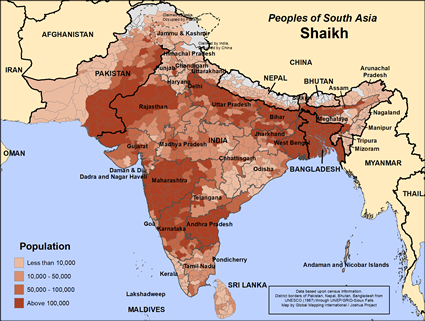The term Shaikh is used for a sociocultural group that originated with Arab settlers in South Asia which now includes many subgroups, some of which intermarry in Bangladesh with non-Shaikh Bengali Muslims and some of which don't.
Islam arrived in the area now known as Pakistan in 711 AD when a Muslim Arab army conquered the northwestern part of the Indus Valley from Jammu and Kashmir to the Arabian Sea. Technocrats, bureaucrats, soldiers, traders, scientists, architects, teachers, theologians and sufis flocked from the rest of the Arab and Muslim world to the Islamic Sultanate in South Asia and settled permanently.
The descendants of these Arabs usually go by the title of Shaikh and are also known in Pakistan as Muslim Khatri. The Shaikhs of Pakistan, however, claim pre-Islamic ancestry. They are a sub-group of the Zamindar group or qoum, traditionally associated with farming, which is one of the two groups making up the Pakistani Punjabis (the other group is the Moeens group or quom, who are traditionally artisans). Shaikh is also a term that is usually attributed to the leaders or elders of Arabian social groups. Other variants of this term are Sheik, Shaykh, Shaikh, Cheikh, Šeih, Šejh, Seyh.
After the advent of Islam in South Asia, some high caste (Brahmins, Muslim Rajputs and Khatris) converted to Islam in the Punjab region and adopted this title. They are known as Punjabi Shaikh (Punjabi). The majority of the Punjabi Shaikhs are urbanized and detached from their traditional agricultural ancestry. However, a few families also cultivate their own land in the western districts of Punjab. The main professions of the urban Punjabi Shaikhs are business and public service and are stereotyped for their reputation for business acumen. The Khawaja Shaikh, with their sub-division the Chiniotis and the Qanungoh Shaikh are two such communities.
The Shaikhs are not bound by one profession. The Shaikh can be broadly grouped into five communities. Three of these communities are the Siddiks, Farukis and Abbasi who are often descendants of Arab immigrants. The other two are the Chistis and Kuraishis communities who tend to be mainly from converts to Islam.
They are not vegetarian, and their common food is rice, mutton and vegetables. Common surnames are Mondal, Siddiqui, Usmani, Faroqui and Sheikh.
Shaikhs profess Islam and have both Sunni and Shia Muslims among them. Both groups try to obey the teachings of the Koran and the prophet Mohammad. They believe that by following the Five Pillars of Islam that they will attain heaven when they die. However, Allah, the supreme God of the universe, determines who enters paradise. Sunnis pray five times a day facing Mecca. They fast the month of Ramadan. They attend mosque services on Friday. If a Muslim has the means, he or she will make a pilgrimage to Mecca once in his or her lifetime. Muslims are also prohibited to drink alcohol, eat pork, gamble, steal, use deceit, slander, and make idols. The two main holidays for Sunni Muslims are Eid al Fitr, the breaking of the monthly fast and Eid al Adha, the celebration of Abraham's willingness to sacrifice his son to Allah.
There have been some from this community embracing the King of kings in recent years. Those who profess Christ need to disciple others who will disciple even more.
Pray for an unstoppable Disciple Making Movement among Shaikhs in Pakistan, India and Bangladesh.
Pray their love for the Lord will give them hearts that will make them stand with him no matter what the cost.
Pray for fervent and faithful intercessors for the Shaikhs in South Asia.
Scripture Prayers for the Shaikh in Pakistan.
| Profile Source: Joshua Project |












